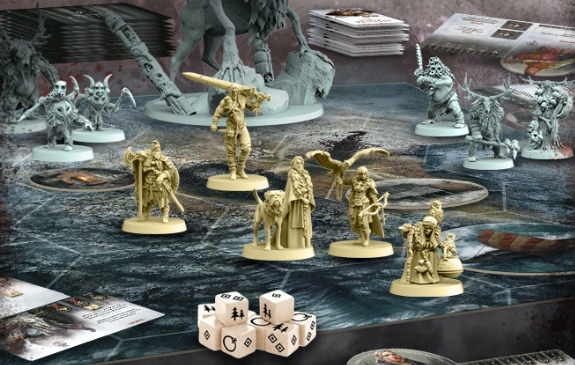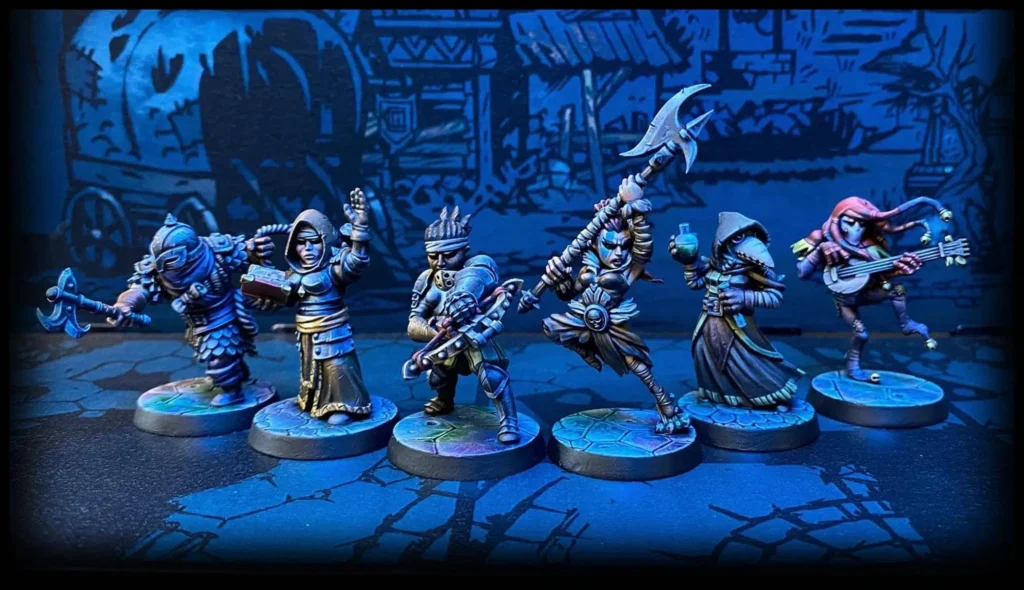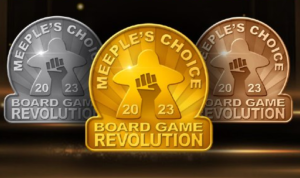
Mythic Games fails to deliver on two Kickstarter projects worth $3.2m, sells IP to CMON
Mythic Games, formerly one of the most successful crowdfunding-focused board game publishers of all time, has given up producing two of its outstanding Kickstarter projects worth $3.2m in favour of selling the intellectual property rights to CMON.
Backers of Hel: The Last Saga, which raised over $2.2m from supporters, and Anastyr, which raised more than $1m, have been living in uncertainty for months about whether they will receive their games after Mythic hit serious financial trouble fulfilling its other large crowdfunding projects, including 6: Siege and Darkest Dungeon.
The deal means backers of the two games – some of whom had committed several hundred dollars to fund their development – stand no chance of receiving the games they supported.
CMON, which has a string of heavyweight Kickstarters including Zombicide, Massive Darkness 2 and Cthulhu: Death May Die under its belt, said neither Hel nor Anastyr “are currently ready for publication in their current state and will require substantial effort to complete them”.
The company said it will now go through “an extensive development and play-testing process” for both games, with their own versions being offered free to original backers from Mythic’s campaigns if they wish to receive it – although backers will have to pay shipping and VAT on these games.

That is likely the only real course of action for most supporters if they wish to receive anything at all, however. Mythic says it is honouring refund requests for its games on a first-come, first served basis, but backers are complaining of a glacially slow process, with refunds requested from as long ago as July 2022 still pending – and plenty believe Mythic will never have the funds available to honour every request.
Mythic said in a Kickstarter update to Hel and Anastyr backers, “We’ve been focusing on the delivery of the 6: Siege and Darkest Dungeon projects, which has necessitated a difficult request to our backers to contribute to the extra costs.
“Our team, reduced since our reorganization, has been monopolized on this task, but we have continued to seek solutions for the delivery of Hel.
“Today, we have to admit that this game, as it was conceived from the beginning, is excessively difficult, if not impossible, to complete with our current means, despite the enormous resources already committed, whether in terms of time, team, or budget.
“Unless, of course, we were to ask our backers for a financial contribution. A contribution for this game would far exceed what we’ve been asking for other projects, knowing that backers would also have to wait a long time to receive it. This did not seem like an acceptable solution to us.”
Company co-founder Leonidas Vesperini told BoardGameWire last October that the company had slashed its staff numbers by 60%, with the vast majority of the less than a dozen employees remaining being largely outsourced.
Mythic had already heavily cut its portfolio of games through sales of IP to other publishers, in order to focus on Darkest Dungeon, Hel and Anastyr – while Vesperini said three months ago that he and fellow co-founder Benoit Vogt had not paid themselves a salary from Mythic since the beginning of 2023.
Those decisions saw the firm slash its operating costs by 80%, which has left it unable to develop or launch new projects – although given the financial issues racking the business it is questionable what levels of support a new crowdfunding project from Mythic would receive.
Mythic, which was launched by Vesperini and Benoit Vogt in 2015, quickly made a name for itself as one of the tabletop industry’s highest-grossing Kickstarter specialists, scoring millions of dollars across campaigns including Time of Legends: Joan of Arc and Solomon Kane.
But the company was left fighting for its survival in the wake of the Covid-19 pandemic after rising prices left it struggling under the weight of its expensive to produce, miniatures-heavy projects.
Its greatest crowdfunding success – a tabletop adaptation of the Darkest Dungeon video game which raised more than $5.6m from over 28,000 supporters – also looks set to go down as the company’s biggest failure, after rising prices and high inflation left a multimillion-dollar hole in its finances.

In the summer of 2022 Mythic took the unprecedented step of telling Darkest Dungeon backers they would have to commit more money if they wanted to receive their game at all – between $18 and $69 each for ‘Wave 1’, comprising the English version of the core set, an expansion and several add-ons, on top of the $100 to $330 plus shipping they had already spent on the original crowdfunding campaign.
That contribution would make up about 50% of the extra costs, with Mythic saying it would provide another $775,000 and Darkest Dungeon video game developer Red Hook agreeing to commit $100,000.
More than 80% of backers duly paid up in order to get Wave 1, and were told that if they were also expecting projects in Wave 2 – several more expansions, add-ons, and the full-range localised into six other languages – they would not have to make any further payments.
But Mythic went back on that commitment in October last year, with Wave 1 backers being asked for another $13 to receive each of the Wave 2 expansions they are expecting, with even more added on top for shipping. Some backers have seen their total extra bill across both waves reach more than $380 – around double their original pledge.
The chaos which engulfed the Darkest Dungeon campaign also extended to Mythic’s Kickstarter for 6: Siege, a tabletop adaptation of the Ubisoft video game Rainbow Six: Siege.
Mythic presented backers of that game with a similar ultimatum earlier last year – contribute up to $249 more, depending on pledge level, or do not receive the game.
Unsurprisingly, Mythic has suffered a heavy backlash from its Kickstarter backers over the repeat requests to pay extra for their games, with accusations of everything from Ponzi schemes, ransoming and general mismanagement being levelled at the company.
Up until last week Mythic has maintained it is determined to deliver its outstanding projects – but the failure to do so with Hel and Anastyr now calls into question whether backers of its other outstanding games will witness a similar outcome.
They include Rise of the Necromancers and Monsterpocalyse, which raised more than $1.6m between them on Kickstarter.
BoardGameWire has reached out to Mythic about the CMON deal and the future of the company, but is yet to receive answers to our questions.







I was in for $400 on Darkest Dungeon before they asked for the first ransom. I begrudgingly paid the extra $69 and moved on… Until they demand much more money again or I would not recieve the expansions and add ons. I told them to go F themselves.
Backed the monpoc game years ago, really wished I didn’t. It’s pretty much impossible to get a refund, and I’ve not got much hope in the company at all for the future of it, as it’s not their IP (it’s privateer presses)
I just hope PP gets on their case, as I’d hate to see monpoc go down the drain because of it.
I wonder what will the authorities think of them charging VAT and shipping for a non-existing product.
[…] I haven’t even hit on how many people have lost money through crowdfunding when the publisher never actually delivers the game in question. Like this example of Mythic Games failing to deliver on over 3.2m between two Kickstarter campaigns […]
Well, you need to add the money received on the PM and the people that did not pay Mythic Games ransom requests in. 6 Siege and Darkest Dungeon and the backers from Rise of the Necromancers and Monsterpocalypse. So, there are plenty more of fleeced disappointed backers and many millions more.
This is terrible and hope that authorities step-in something is clearly off.
[…] BoardGameWire […]
[…] to CMON for an undisclosed amount. There’s excellent reporting about this situation from Board Game Wire (plus an interview with Mythic) and Alex at BoardGameCo. I also previously discussed what creators […]
[…] Mythic Games’ fall from one of the most successful crowdfunding-focused board game publishers of all time to one beset by financial woes has been swift. In the 18 months since the company took the unprecedented step of asking Kickstarter backers for more money to complete a project – the $5.6m-crowdfunded Darkest Dungeon board game – Mythic has faced spiralling costs, outsourced the entirety of its remaining workforce and given up on delivering two Kickstarters worth a combined $3.2m, instead selling the IP for those games to CMON. […]
[…] quite a few publishers had to ask for additional funding, or delivered the game with a huge delay (or not at all). This undermined the trust in crowdfunding a bit, and turned even some of the more enthusiastic […]
[…] are also partial acquisitions like when CMON bought the brands Hel and Anastyr from Mythic Games a few months ago. There’s also an even more partial share-based acquisitions (Stonemaier […]
[…] Dungeon board game maker Mythic Games is fighting to survive as spiralling costs weigh on businessMythic Games fails to deliver on two Kickstarter projects worth $3.2m, sells IP to CMONDeath threats, doxxing and IP deals: Mythic Games’ co-founder on the fallout from its CMON […]
[…] While both of these games ultimately delivered on their core expressions, Mythic was forced to sell off several other intellectual properties such as Anastyr and Hel: The Last Saga to competitor CMON in order to remain solvent. CMON has said that it will offer existing backers of […]